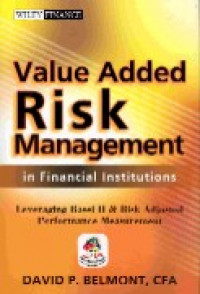
Value added risk management in financial institutions : leveraging Basel II & risk adjusted performance measurement
| Gmd : Text
| Availability :
| 00000009424 | HD61 .B45 2004 | (General Book) | Available - Ada |
Text covers the strategic aspects of risk management, providing an understanding of risk optimization, capital allocations, and capital restructuring. For financial executives.
The typical financial executives view of the value of risk management in their financial institution is based on the belief that risk management focuses on loss avoidance. This view is based on the history of risk management being control focused. However, risk management has evolved rapidly to address the more strategic issue of optimization of return on risk. This evolution has been accompanied by statistical, mathematical and financial techniques which when actively applied can direct an institution towards risk taking those activities, which produce disproportionately high returns on risk. The book aims to describe these techniques, illustrate their application, and discuss their strategic value in the management of financial institutions.
Given that financial institutions will have to make significant investments in their risk management systems to comply with the regulatory capital calculation requirements of BIS II, the book shows how to leverage this investment to extract shareholder value. Key concepts illustrated and explained in detail include :
* opportunity cost of capital
* economic profit
* risk adjusted returns on capital
* economic capital measurement and their relationship to economic capital allocation
* capital structuring
* capital budgeting
The use of risk adjusted performance information in the formulation of management strategies that seek to optimise returns to shareholders are discussed in depth and illustrated by practical case studies of several leading financial institutions. Finally, practical incentive and technology challenges are addressed and pragmatic recommendations for overcoming these challenges are given.
The book aims to describe these techniques, illustrate their application, and discuss their strategic value in the management of financial institutions.
Table of Contents
Introduction: Risk Management and Value Creation
Chapter 1: Risk Management Stands at the Nexus of Value Creation in Financial Institutions
Chapter 2: Who Should Care about Risk Management, Capital Allocation and Why?
Chapter 3: Optimising Return, Risk, and Value ? The Link Between RAROC and Economic Profit
Chapter 4: Determining Capital Allocations.
Chapter 5: Determining the Cost of Capital
Appendix 1: Case Study of Economic Capital Requirement for Start Up
Chapter 6: Linking Capital to Value - Capital Structuring
Chapter 7: Linking Risk to Return and Value - Setting Economic Capital
Chapter 8: Impact of Basel II - Installing and Using IT Systems to Measure Regulatory and Economic Risk
Chapter 9: Economic Profit and RAROC Frameworks: Case Studies and Common Errors.
Chapter 10: Conclusion.
| Series Title |
-
|
|---|---|
| Call Number |
HD61 .B45 2004
|
| Publisher Place | Singapore |
| Collation |
322p.: ill.; 24cm.
|
| Language |
English
|
| ISBN/ISSN |
0470821159
|
| Classification |
HD61
|
| Media Type |
-
|
|---|---|
| Carrier Type |
-
|
| Edition |
-
|
| Subject(s) | |
| Specific Info |
-
|
| Statement |
-
|
| Content Type |
-
|
No other version available







